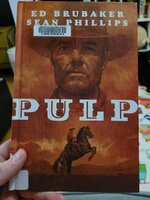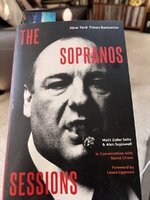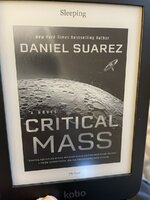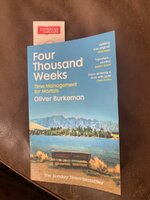You are using an out of date browser. It may not display this or other websites correctly.
You should upgrade or use an alternative browser.
You should upgrade or use an alternative browser.
2023 Reading Challenge
- Thread starter Selaws
- Start date
jamieanderson1968
ninniest jackaninny
Nee Lewman
बैस्टर्ड
Book 6
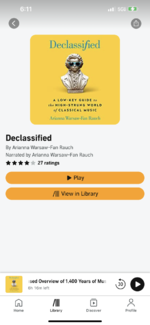
Declassified by Arianna Warsaw-Fan Rauch
I’m counting audio books dammit. I think this ended up being a bigger time commitment then if I had read it.
Read by the author.
The remedial music theory was what it was. She did a nice job of putting some composers in context. I also really enjoyed the insider’s view of the world of classical musicians and the author’s complex relationship with both being a performer and an enthusiast of the music.
It probably would have dictated a lot more listening if I had been reading it.
Also, I’m fairly certain this is the first audiobook I’ve ever completed. Tapes and cds made it much to difficult to remember where I was at and what not.

Declassified by Arianna Warsaw-Fan Rauch
I’m counting audio books dammit. I think this ended up being a bigger time commitment then if I had read it.
Read by the author.
The remedial music theory was what it was. She did a nice job of putting some composers in context. I also really enjoyed the insider’s view of the world of classical musicians and the author’s complex relationship with both being a performer and an enthusiast of the music.
It probably would have dictated a lot more listening if I had been reading it.
Also, I’m fairly certain this is the first audiobook I’ve ever completed. Tapes and cds made it much to difficult to remember where I was at and what not.
jamieanderson1968
ninniest jackaninny
I used to more audiobooks (and podcasts) when I had a long commute. Every so often I think of listening to an audiobook but then I am afraid it will take months to finish it.Book 6
View attachment 166341
Declassified by Arianna Warsaw-Fan Rauch
I’m counting audio books dammit. I think this ended up being a bigger time commitment then if I had read it.
Read by the author.
The remedial music theory was what it was. She did a nice job of putting some composers in context. I also really enjoyed the insider’s view of the world of classical musicians and the author’s complex relationship with both being a performer and an enthusiast of the music.
It probably would have dictated a lot more listening if I had been reading it.
Also, I’m fairly certain this is the first audiobook I’ve ever completed. Tapes and cds made it much to difficult to remember where I was at and what not.
Nee Lewman
बैस्टर्ड
I mean I started this one in November. The next audiobook I have on deck is Our Band Could be Your Life. It’s 3x as long. LolI used to more audiobooks (and podcasts) when I had a long commute. Every so often I think of listening to an audiobook but then I am afraid it will take months to finish it.
WhiteDahlias
Active Member
Oh hey... I read some books and then forgot to post about them (life's been weird lately, lol)
1. Floating, Brilliant, Gone - Franny Choi 4.5/5 - Started off the year with a poetry collection that I ended up really liking.
2. I love this part - Tillie Walden 3/5 - a YA graphic novel about a relationship. I loved the art style but the story was kind of basic.
3. The World Keeps Ending, and the World Goes On - Franny Choi 4/5 - Another poetry collection by this author. I think she's become one of my favorites. This was her newest collection from 2022.
4. March: Book 1 - John Lewis & Andrew Aydin 4/5 - I still need to read the other 2 books in this graphic novel series but I ran out of hoopla credits for January. An autobiographical history of the civil rights movement that I would definitely recommend if you haven't read them yet.
5. Bad Gays: A Homosexual History - Huw Lemmy & Ben Miller 4/5 - I'm not a podcast person so I didn't realize this was originally a podcast but I thought this was a very interesting look into a lot of historical figures and how their actions had a lasting effect on the LGBTQIA+ community. I think the chapter that I thought about the most was the one about Margaret Mead just because she was one of the people that I was the most familiar with, but they were all interesting.
6. Mr. Fox - Helen Oyeyemi 4/5 - Lots of 4's this year. I've heard mixed things about Oyeyemi's writing, but it worked really well for me. I will definitely pick up some more of her books in the future.
I had a bad case of startitis at the beginning of this month so I'm in the middle of about 4 or 5 books at the moment but I can hopefully finish some of them up soon.
1. Floating, Brilliant, Gone - Franny Choi 4.5/5 - Started off the year with a poetry collection that I ended up really liking.
2. I love this part - Tillie Walden 3/5 - a YA graphic novel about a relationship. I loved the art style but the story was kind of basic.
3. The World Keeps Ending, and the World Goes On - Franny Choi 4/5 - Another poetry collection by this author. I think she's become one of my favorites. This was her newest collection from 2022.
4. March: Book 1 - John Lewis & Andrew Aydin 4/5 - I still need to read the other 2 books in this graphic novel series but I ran out of hoopla credits for January. An autobiographical history of the civil rights movement that I would definitely recommend if you haven't read them yet.
5. Bad Gays: A Homosexual History - Huw Lemmy & Ben Miller 4/5 - I'm not a podcast person so I didn't realize this was originally a podcast but I thought this was a very interesting look into a lot of historical figures and how their actions had a lasting effect on the LGBTQIA+ community. I think the chapter that I thought about the most was the one about Margaret Mead just because she was one of the people that I was the most familiar with, but they were all interesting.
6. Mr. Fox - Helen Oyeyemi 4/5 - Lots of 4's this year. I've heard mixed things about Oyeyemi's writing, but it worked really well for me. I will definitely pick up some more of her books in the future.
I had a bad case of startitis at the beginning of this month so I'm in the middle of about 4 or 5 books at the moment but I can hopefully finish some of them up soon.
WhiteDahlias
Active Member
Sorry for the double post, but I have one more:
7. Weasels in the Attic - Hiroko Oyamada

(sidetone: This cover is way better than the copy I have)
So... I think this was described on Goodreads as "ueasy" and "surreal" but I didn't really get any of that. It's a collection of 3 short stories that are interconnected and all revolve around a man who's wife wants to have a baby but they are having trouble. Maybe it was the translation but I didn't really get a lot out of this one, I do have her 2 other translated novellas on my iPad though so I will probably give at least one of them a chance.
7. Weasels in the Attic - Hiroko Oyamada

(sidetone: This cover is way better than the copy I have)
So... I think this was described on Goodreads as "ueasy" and "surreal" but I didn't really get any of that. It's a collection of 3 short stories that are interconnected and all revolve around a man who's wife wants to have a baby but they are having trouble. Maybe it was the translation but I didn't really get a lot out of this one, I do have her 2 other translated novellas on my iPad though so I will probably give at least one of them a chance.
avecigrec
Well-Known Member
Book 4
Rush: The Making of A Farewell to Kings: The Graphic Novel by Lindsay Lee, David Calcano, Juan Riera & Ittai Manero
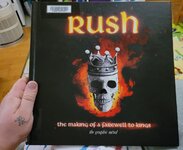
This is an absolute delight! The team does a really great job of conveying so much in a simple, breezy exciting fashion. It's fantastically paced without feeling like it skips out on too much or glosses over anything and there is such a warmth to it that comes from the direct participation of the band and producer Terry Brown. I am by no means a Rush superfan but I do very much enjoy their music and think they seem like genuinely neat dudes, and I thought this was spectacular and could likely be enjoyable for anybody whether they enjoy Rush or not. Definitely worth checking out.
Rush: The Making of A Farewell to Kings: The Graphic Novel by Lindsay Lee, David Calcano, Juan Riera & Ittai Manero

This is an absolute delight! The team does a really great job of conveying so much in a simple, breezy exciting fashion. It's fantastically paced without feeling like it skips out on too much or glosses over anything and there is such a warmth to it that comes from the direct participation of the band and producer Terry Brown. I am by no means a Rush superfan but I do very much enjoy their music and think they seem like genuinely neat dudes, and I thought this was spectacular and could likely be enjoyable for anybody whether they enjoy Rush or not. Definitely worth checking out.
Nee Lewman
बैस्टर्ड
This one is gonna take me forever... it's not just that it is 21 hours long, but I basically go... okay I need to hear that everytime they mention an album...I mean I started this one in November. The next audiobook I have on deck is Our Band Could be Your Life. It’s 3x as long. Lol
Thackeraye
Well-Known Member
Nee Lewman
बैस्टर्ड
Thinking? This would imply philosophy to me, but this looks like business self help to me..., I guess those are called motivational...View attachment 167166
First book of the year. “Thinking” books are my crime novels - easy reads that I can go through fairly quickly. This is a good one.
Thackeraye
Well-Known Member
Was thinking of an alternative to self help. There’s no woo in it, really, if that makes sense. It’s basically just a guy making some conclusions after reader a bunch of philosophy. Time management is always doomed to fail because you can’t do it all, in a nutshell…Thinking? This would imply philosophy to me, but this looks like business self help to me..., I guess those are called motivational...
Thackeraye
Well-Known Member
Books that make me think about stuff = Thinking.Was thinking of an alternative to self help. There’s no woo in it, really, if that makes sense. It’s basically just a guy making some conclusions after reader a bunch of philosophy. Time management is always doomed to fail because you can’t do it all, in a nutshell…
Nee Lewman
बैस्टर्ड
Ah… I’d say that’s philosophy then same as Pirsig or Thoreau, just a bit more practical than say Kant.Was thinking of an alternative to self help. There’s no woo in it, really, if that makes sense. It’s basically just a guy making some conclusions after reader a bunch of philosophy. Time management is always doomed to fail because you can’t do it all, in a nutshell…
Selaws
Well-Known Member
Book 4: The Bear Comes Home by Rafi Zabor (W. W. Norton & Company, 1998)
492 pages
It took me a bit longer than expected to read this, but its a pretty chunky book, and with work being particularly busy I haven't had as much chance to read. From the cover and title, I assumed it was a play on words, kind of like how Mingus was a huge 'bear of a man'. In actual fact, this fictitious novel centers around a sentient, jazz-playing bear whose role is very much that of the struggling musician. He has to overcome the early days of hiding his true self by playing a dumb dancing bear, but ultimately shocks the world when he comes out and reveals his true self. It's certainly a strange concept and at times it goes a bit too far in my opinion, but it really is a fantastic story.
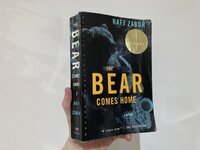
492 pages
It took me a bit longer than expected to read this, but its a pretty chunky book, and with work being particularly busy I haven't had as much chance to read. From the cover and title, I assumed it was a play on words, kind of like how Mingus was a huge 'bear of a man'. In actual fact, this fictitious novel centers around a sentient, jazz-playing bear whose role is very much that of the struggling musician. He has to overcome the early days of hiding his true self by playing a dumb dancing bear, but ultimately shocks the world when he comes out and reveals his true self. It's certainly a strange concept and at times it goes a bit too far in my opinion, but it really is a fantastic story.

jamieanderson1968
ninniest jackaninny
Book 6 - Ian Winwood / Bodies
I am still working on book 4 (Spaceships over Scotland) but it is a physical, signed copy so I am just reading that before going to bed. But started this one over breakfast.
Ian Winwood explores the industry's reluctance to confront its many failures in a far-reaching story which features first-hand access to artists such as Foo Fighters, Green Day, Trent Reznor, Biffy Clyro, Kings of Leon, Chris Cornell, Mark Lanegan, Pearl Jam. Much more than a touchline reporter, Winwood also tells the tale of his own mental-health collapse following the shocking death of his father. Written with warmth, humour and bracing honesty, Bodies is a deeply personal story and essential reading for musicians and fans alike.
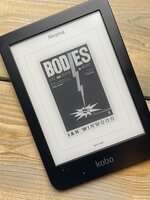
I am still working on book 4 (Spaceships over Scotland) but it is a physical, signed copy so I am just reading that before going to bed. But started this one over breakfast.
Ian Winwood explores the industry's reluctance to confront its many failures in a far-reaching story which features first-hand access to artists such as Foo Fighters, Green Day, Trent Reznor, Biffy Clyro, Kings of Leon, Chris Cornell, Mark Lanegan, Pearl Jam. Much more than a touchline reporter, Winwood also tells the tale of his own mental-health collapse following the shocking death of his father. Written with warmth, humour and bracing honesty, Bodies is a deeply personal story and essential reading for musicians and fans alike.

WhiteDahlias
Active Member
Book 8: The Atlas Six - Olivia Blake 3-3.5

I listened to the audiobook of this one and I didn't think this was the best-written book of all time, and people who read more fantasy/dark academia than I do would probably have issues with it, but I enjoyed it enough to want to pick up the second one eventually. I did predict the twist at the end but then the ending also seemed kind of out of nowhere? I think maybe it had to do with the pacing being kind of off.
Book 9: Difficult Women - Roxane Gay 3.5 (but better than the last one)
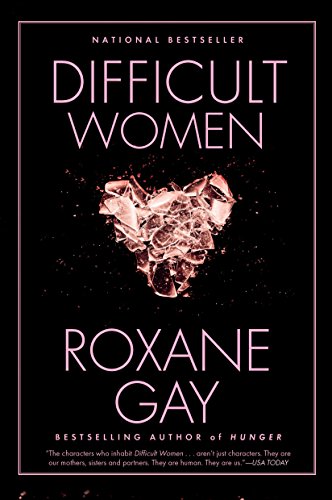
I knew who Roxane Gay was but I had never read anything of hers so I picked up this short story collection. I thought a lot of them were very good character studies with wonderfully complex female characters, but I also thought a lot of them had very similar plots and themes so they blend together a bit and felt kind of same-y. I think my favorite story was the post-apocalyptic one about how the world adapts once the sun goes out. It's definitely the most original one of the collection.

I listened to the audiobook of this one and I didn't think this was the best-written book of all time, and people who read more fantasy/dark academia than I do would probably have issues with it, but I enjoyed it enough to want to pick up the second one eventually. I did predict the twist at the end but then the ending also seemed kind of out of nowhere? I think maybe it had to do with the pacing being kind of off.
Book 9: Difficult Women - Roxane Gay 3.5 (but better than the last one)

I knew who Roxane Gay was but I had never read anything of hers so I picked up this short story collection. I thought a lot of them were very good character studies with wonderfully complex female characters, but I also thought a lot of them had very similar plots and themes so they blend together a bit and felt kind of same-y. I think my favorite story was the post-apocalyptic one about how the world adapts once the sun goes out. It's definitely the most original one of the collection.
Bull Shannon
Well-Known Member
Book 4: Children of Dune, by Frank HerbertBook 1: Great Expectations, by Charles Dickens
View attachment 165534
Great Expectations? Great book!
Despite his cultural ubiquity, I've never really read any Dickens prior to this. I've been meaning to, and decided to go with this, which is on the shorter end (for Dickens). I generally knew the plot due to exposure from Wishbone, but had a cracking time reading it nonetheless. Don't know what to say; guy can write. I want to pick up a few more Dickens this year; my goal is two books a month, and based on my current pace I should be able to devote a month or two to a single book.
I'm open to anyone's Dickens recommends!
Book 2: Swag, by Elmore Leonard
(apologies for the downright awful cover)
View attachment 165535
Every now and then I pick up some Leonard; he writes snappy dialogue and driving plots. I really gobbled this one down, too; I went to Florida last week and basically finished this on the flight there.
Elevator pitch: a used-car salesman teams up with a petty crook after catching him trying to steal a car from the lot. The salesman develops a dozen rules for armed robbery, mostly revolving around being very careful with your money/company, as well as only robbing sure things and walking away the moment things seem dicey. (This reminds me of an episode of the superlative Criminal podcast, in which a man goes on a bank robbery spree, just to see if he can; he goes in unarmed, gives the clerk a note asking for the cash drawer, and just walks away with or without the money).
Lo and behold, the two criminals turn against one another. Ironically, it's the author of the rules who begins throwing them out the window, leading to tensions. Lots of Leonard's novels have been made into movies, and this could be a pretty fun one.
Book 3: Pnin, by Vladimir Nabokov
View attachment 165536
Another goal of mine this year is to reread a few favorites. Oddly enough, my goodreads rating from initially reading this ~10 years ago was three stars. It's remained in my mind since, however, so I read it over the rest of my Florida trip.
I love Nabokov; he has such a way with words that just bowls me over. Pnin especially is a witty story, focusing on a middle-aged Russian professor trying to adjust to life in America. He's the subject of derision from his peers and is portrayed by the unnamed narrator as a bumbling, ineffectual fool. However, he's also deceptively graceful and sweet.
On the heels of this I ordered The Defense; I realize I've only read four Nabokovs, though I've read all of them twice now.
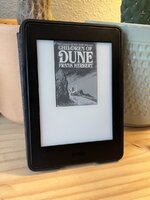
Hmm. Maybe I didn't engage with this book on the right level, but I found it dumb and boring. I actually quite liked Messiah previously, but the story here is very thin. A lot of hemming and hawing over the prospect of incest, and a plot by the villains to (checks notes) train wild tigers to attack anyone wearing a specific outfit, and then gifting that outfit to the Atreides twins. That's a Wil E. Coyote-ass plan.
Book 5: The Slynx, by Tatyana Tolstoya
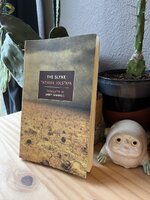
The jacket describes this as Nabokov's Pale Fire by way of A Clockwork Orange, so of course I'm there. A semi-satirical post-apocalyptic novel, The Slynx concerns society after an event called The Blast. Mutations are common (called Consequences, they can be anything from a prehensile tail to claws to heat vision), and a number of people alive before The Blast mysteriously remain immortal (at least safe from old age and disease; murder and misadventure can still take you out). The protagonist, Benedikt, works for an odd, despotic ruler, who makes a room full of people copy books and put his name on them. Free thought and creative thinking are discouraged; rumor has it the mystical Slynx will find you, look at you, and you'll never be the same. After some time, Benedikt gets married and joins his father in-law in raiding homes for hidden books, which they steal and read for themselves. Weird, absurd stuff, great prose. Feels like a comment on Russian culture and history, of which I have minimal context.
Book 6: A Closed and Common Orbit (Wayfarers #2), by Becky Chambers
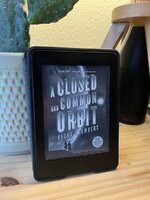
You may recall last year I read Chambers' Monk and Robot series and loved it a ton. I'd previously read Wayfarers #1, A Long Way to a Small Angry Planet, and found it pleasant but a bit lacking; some of the characters were squee/holds-up-spork so-random, and the main ensemble had a bit of Burger King Kids Club syndrome.
A friend recently told me they read the whole series and that it's worth it. They were right; Chambers hones in on the characters really well and does a good job of presenting a cozy story which eschews superficial action or conflict, while also providing a propulsive story and strong emotional stakes. At one point, two characters resolve to escape a situation and despite that being the obvious story path, the way it unfolded made my heart swell; it's a skilled writer who can take a foregone conclusion feel like an organic triumph.
jamieanderson1968
ninniest jackaninny
I re-read the original Dune books when it was first announced Denis Villeneuve was making the first one. Could not make it through Children of Dune, but finished all the others.Book 4: Children of Dune, by Frank Herbert
View attachment 167783
Hmm. Maybe I didn't engage with this book on the right level, but I found it dumb and boring. I actually quite liked Messiah previously, but the story here is very thin. A lot of hemming and hawing over the prospect of incest, and a plot by the villains to (checks notes) train wild tigers to attack anyone wearing a specific outfit, and then gifting that outfit to the Atreides twins. That's a Wil E. Coyote-ass plan.
Book 5: The Slynx, by Tatyana Tolstoya
View attachment 167784
The jacket describes this as Nabokov's Pale Fire by way of A Clockwork Orange, so of course I'm there. A semi-satirical post-apocalyptic novel, The Slynx concerns society after an event called The Blast. Mutations are common (called Consequences, they can be anything from a prehensile tail to claws to heat vision), and a number of people alive before The Blast mysteriously remain immortal (at least safe from old age and disease; murder and misadventure can still take you out). The protagonist, Benedikt, works for an odd, despotic ruler, who makes a room full of people copy books and put his name on them. Free thought and creative thinking are discouraged; rumor has it the mystical Slynx will find you, look at you, and you'll never be the same. After some time, Benedikt gets married and joins his father in-law in raiding homes for hidden books, which they steal and read for themselves. Weird, absurd stuff, great prose. Feels like a comment on Russian culture and history, of which I have minimal context.
Book 6: A Closed and Common Orbit (Wayfarers #2), by Becky Chambers
View attachment 167785
You may recall last year I read Chambers' Monk and Robot series and loved it a ton. I'd previously read Wayfarers #1, A Long Way to a Small Angry Planet, and found it pleasant but a bit lacking; some of the characters were squee/holds-up-spork so-random, and the main ensemble had a bit of Burger King Kids Club syndrome.
A friend recently told me they read the whole series and that it's worth it. They were right; Chambers hones in on the characters really well and does a good job of presenting a cozy story which eschews superficial action or conflict, while also providing a propulsive story and strong emotional stakes. At one point, two characters resolve to escape a situation and despite that being the obvious story path, the way it unfolded made my heart swell; it's a skilled writer who can take a foregone conclusion feel like an organic triumph.
Plus I need to use "Burger King Kids Club syndrome" more often
